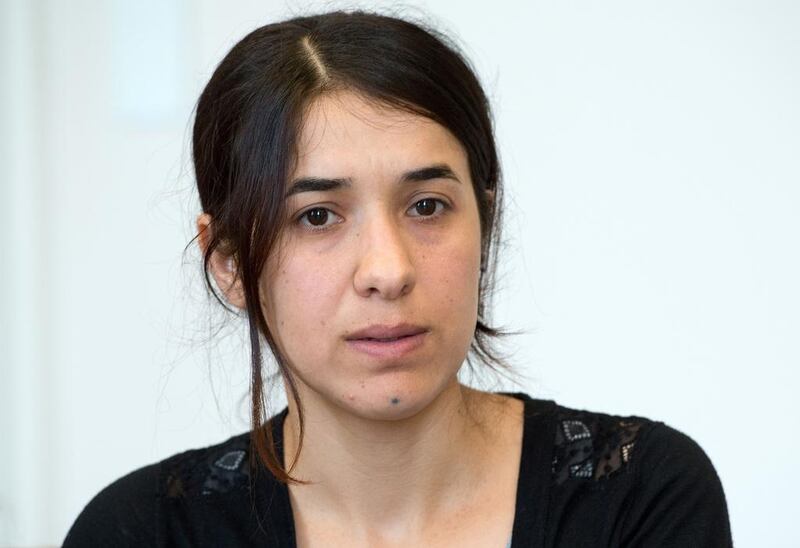GENEVA // Two Yazidi women who endured months of harrowing sexual assaults in the hands of ISIL before escaping have been awarded the Sakharov prize for freedom of thought and expression by the European Parliament.
Nadia Murad and Lamia Haji Bashar – now the faces of a campaign to protect their Yazidi people from a genocidal threat – were among thousands of women and girls abducted and held as sexual slaves by ISIL after they rounded up Yazidis in their village of Kocho, near Sinjar in north-west Iraq, in the summer of 2014.
Ms Murad, a slight, softly spoken young woman, was taken by ISIL from her home village of Kocho near Iraq’s northern town of Sinjar in August 2014 and brought to the city of Mosul.
As a captive of the reviled extremist group, Ms Murad, now 23, said she was tortured and raped.
ISIL militants made her disavow her Yazidi faith, an ancient religion with more than half a million adherents concentrated near the Syrian border in northern Iraq.
“The first thing they did was they forced us to covert to Islam,” Ms Murad said earlier this year at the United Nations in Geneva, through an Arabic translator.
In a December speech at the UN Security Council in New York, Ms Murad recounted her so-called “marriage” to one ISIL captor.
He mocked her, beat her and then ordered her to wear makeup and revealing clothes, she told the council.
“I was not able to take any more rape and torture,” she said, explaining why she decided to flee.
Ms Bashar is also from Kocho and was just 16 when she was taken.
“This is a remarkably strong woman who endured things I wouldn’t wish on anyone,” a psychologist who helped arrange for her to receive treatment in Germany, Jan Kizilhan, said.
“Many of her close acquaintances and relatives were killed by Islamic State before her eyes before she was captured, enslaved, sold several times and repeatedly raped along with other Yazidi girls.”
She tried to break free of her captors several times during her 20 months in captivity before finally succeeding.
But even after her escape, she fell into the hands of an Iraqi hospital director in the town of Hawjiah who also abused and raped her and several other victims.
She finally made it out with two friends. But en route to the city of Kirkuk, one of her friends trod on a landmine and was killed instantly, said Mirza Dinnayi, founder of the German-Iraqi aid group Air Bridge Iraq.
Ms Dinnayi has been looking after Ms Bashar since her arrival in Germany in April. Bashar escaped with her life but suffered horrific burns to her face from the blast, losing her right eye.
Guy Verhofstadt, the leader of the Liberal ALDE group, said on Thursday that Ms Murad and Ms Bashar were “inspirational women who have shown incredible bravery and humanity in the face of despicable brutality. I am proud that they have been awarded the 2016 Sakharov prize.”
Parliamentarian Beatriz Becerra Basterrechea, who backed the two winners’ nominations, said the prize is “a recognition of Nadia’s and Lamiya’s fight throughout their life. Both have impressively overcome the brutal sexual slavery they were exposed to by jihadist terrorists and become an example for all of us”.
* Reuters, Agence France-Presse and Associated Press





